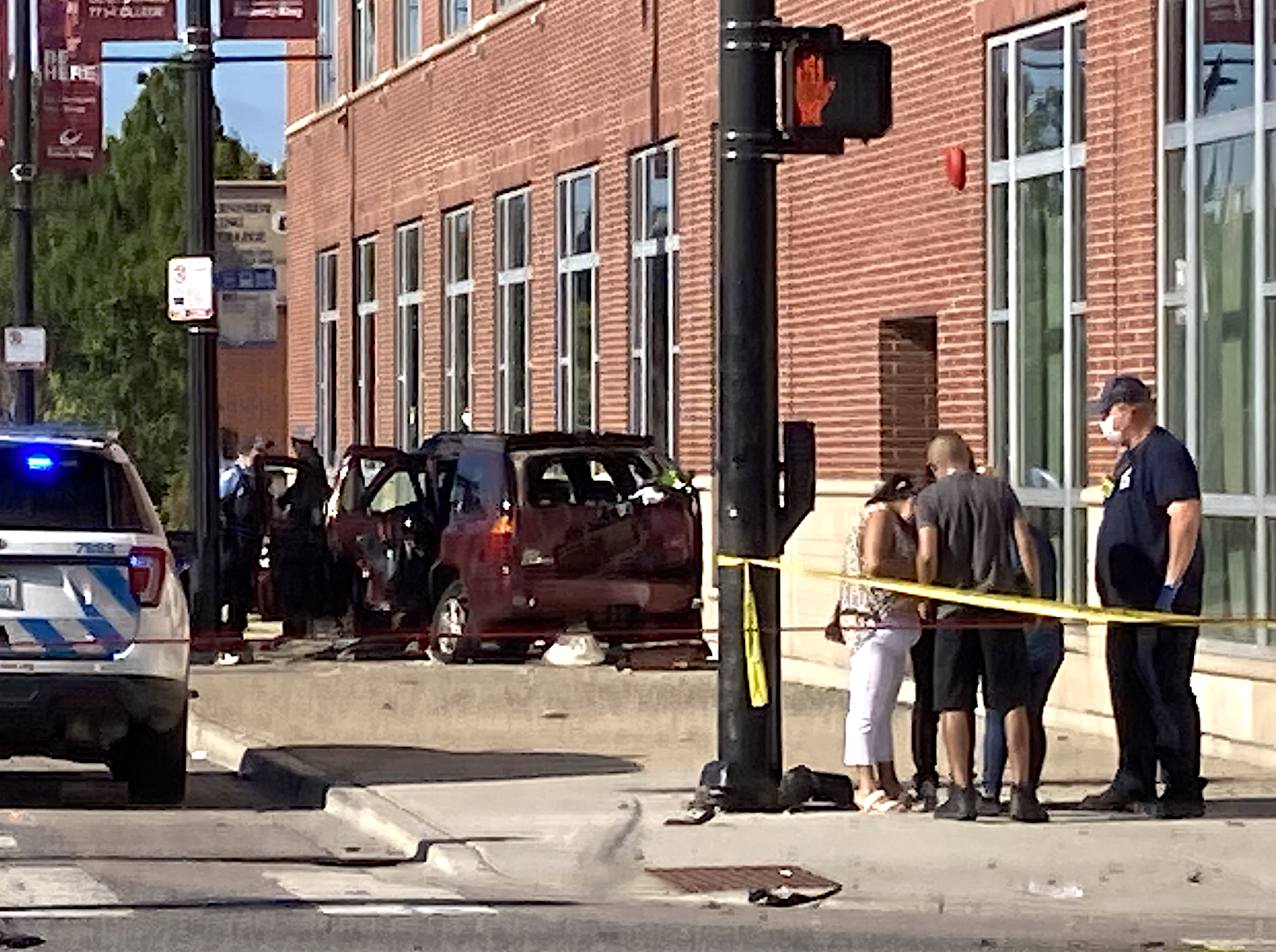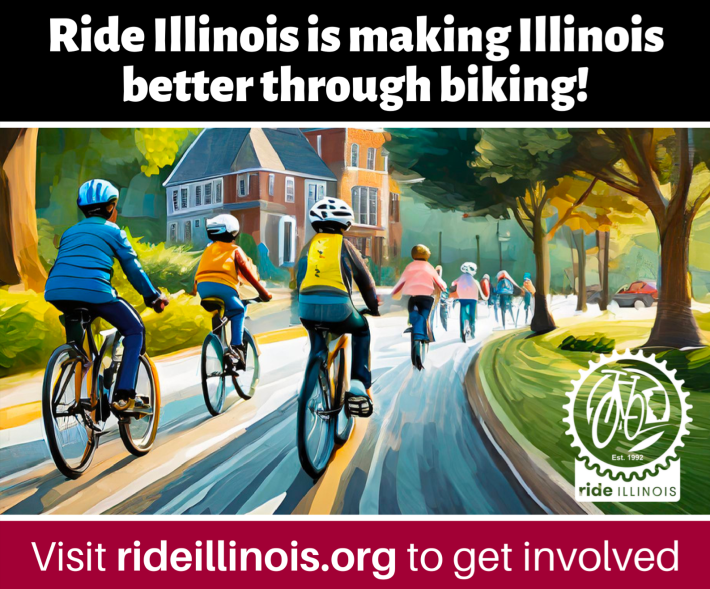
Read "Part 2: How do we convince residents and alders to support safer street designs?" here.
Recently, two of Chicago's most important transportation issues have been the debate over passing a default 25 mph speed limit, and the discourse on whether traffic cameras should be used to help prevent serious and fatal crashes.

José Manuel Almanza, Director of Advocacy & Movement Building for the local mobility justice nonprofit Equiticity, has weighed in on both matter. In April 2024, he told Streetsblog's Cameron Bolton that if the City Council passed the 25 mph limit, his organization wanted to see more street redesigns that encourage motorists to drive at safer speeds, rather than more enforcement. (The proposed ordinance was voted down last February.)
And last March, Almanza posted on social media that he did not object to the fact that few of Chicago’s 16 new speed cameras would be located on the South and West sides, because those areas "need more infrastructure resources, not punitive fines and fees.”
I thought those were interesting perspectives, so I contacted Almanza and Equiticity Executive Director Oboi Reed to ask if they were interested in scheduling an interview. "In a nutshell, we’d talk about the pros and cons of automated enforcement (proven to save lives, helps reduce in-person policing, and there are ways to make the fines more equitable – is this something Equiticity could support?), and/or what is being done now, and should be done in the future, to effectively bring down crash numbers without enforcement."

They graciously agreed to have Almanza talk with me. Here's a transcription of our in-depth conversation, edited for clarity and brevity, and divided into two parts. This the first portion, focusing on the current state of crash fatalities in our city, the proposed 25 mph speed limit, and what could be done to make traffic law enforcement less regressive, if that's even a possibility.
While I did the lion's share of the talking in this part of our conversation, Almanza will get more airtime in tomorrow's segment on the alternative strategy of preventing traffic deaths through safer street design. He argues that that's the only truly equitable solution.
John Greenfield: If you don't mind, the way I'd like to do this discussion, I would like to start by going over some of the facts of the automated enforcement and speed limit issues as I understand them. If you hear me saying anything that you think is factually incorrect or inaccurate, feel free to stop me to discuss. Otherwise, I'll just present this stuff for a few minutes, and then we can discuss what issues are raised, and what Equiticity's viewpoint is on how we should address these issues.
José Manuel Almanza: OK.
JG: So a huge problem we have in Chicago is traffic crash fatalities. [109 people died in collisions on our city's surface streets in 2024.] According to Chicago Department of Transportation data, although African Americans only make up about 30 percent of the city's population, about two-thirds of crash fatality victims are Black.
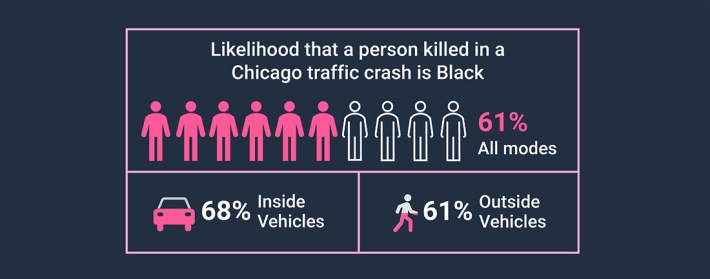
We recently got 16 new speed cameras in Chicago. Mayor [Brandon] Johnson was pretty upfront about the fact that he was doing this because he wanted to raise revenue, which Streetsblog has said is the wrong approach for using automated enforcement. But anyway, because of equity concerns, almost none of these 16 cameras were included on the South and West sides, which are the parts of town where most traffic crash fatalities happen.
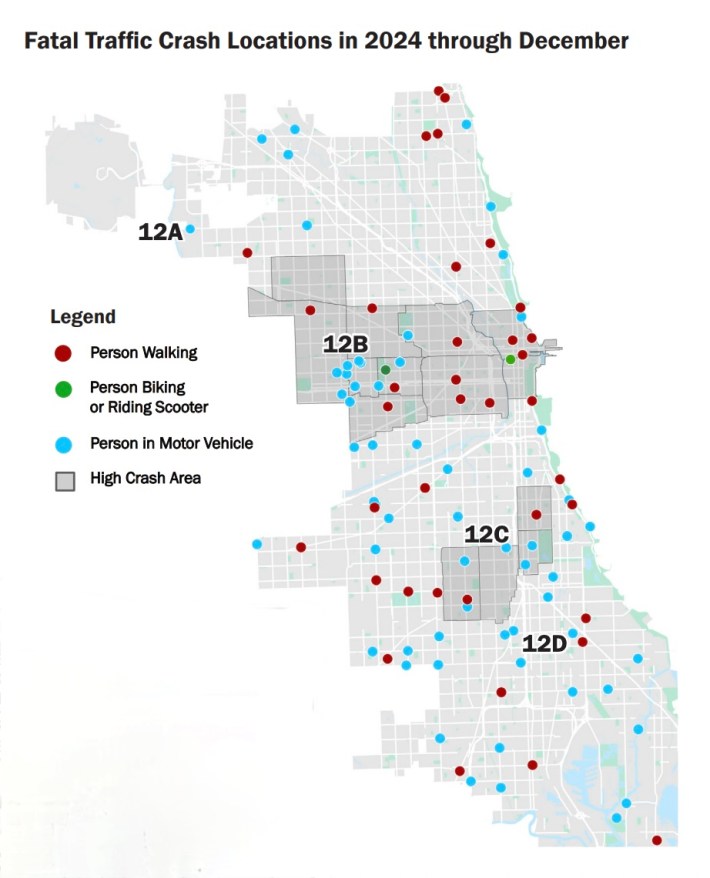
There are a lot of arguments against automated enforcement. So I just want to go over some of that stuff. In January 2022, there was a UIC study and a ProPublica report with similar findings. The UIC study found that automated enforcement is, in fact, saving lives in Chicago.
CDOT has also put out numbers that show that the speed cameras are working. For example, some recent data they put out with 2012-2013 data as the baseline, found that between 2012-2013 and 2022-2023, while the number of crashes rose by 28 percent city wide, it only increased by 2 percent near the speed cameras. While injury and fatal crashes went up by 19 percent citywide during that decade, they fell by 11 percent close to cameras.

I won't go through that whole list, but basically, they've got some convincing numbers there. So we basically know that speed cameras do save lives. That doesn't mean they're the only way to do it, but we'll address that later on today.
So there are arguments that come up when people discuss speed cameras, that also came up during the recent City Council debate over whether we should lower the speed limit to 25 mph. The experiences of other cities indicate that would significantly lower our traffic crash death numbers. Some of the alders during that discussion argued that speed cameras are concentrated in communities color. If you look at the city speed camera map, you'll see that's not actually the case.
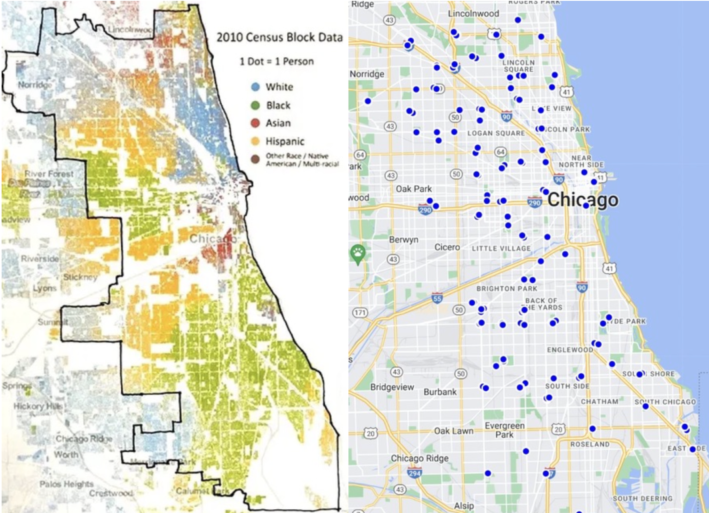
I've also seen arguments that one reason why there are higher ticketing rates in communities of color on the South and West sides may be because the speed cameras are located on wider streets in those parts of town. We've done some research at Streetsblog, and that's not actually the case.
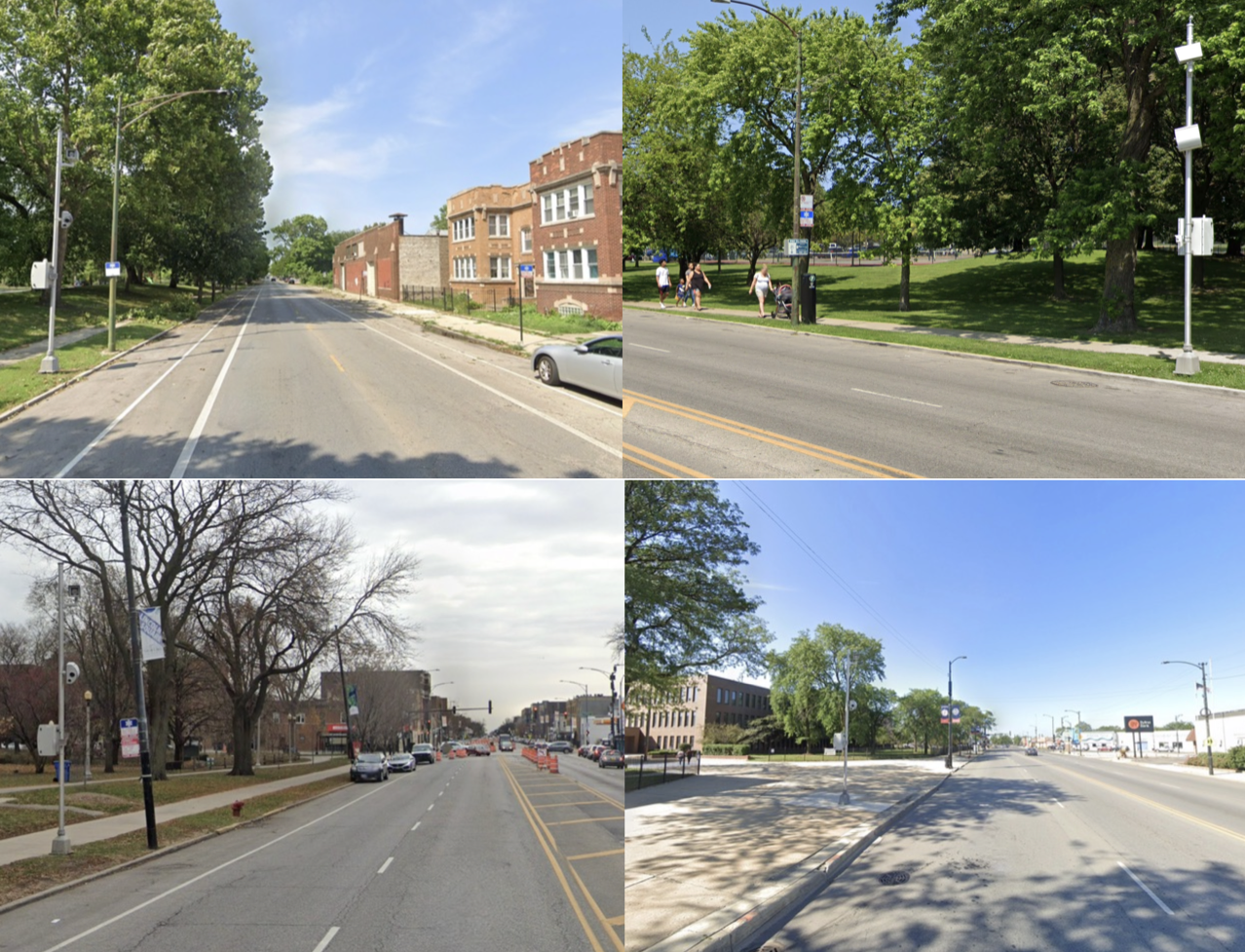
But there are some legitimate equity-related factors that may help explain why a disproportionately high number of Black and Latino motorists in Chicago are getting ticketed by the cameras for speeding. Some things that probably are contributing to that are that people of color in our city are more likely to work jobs that require driving. They're more likely to live in parts of town with poor transit access and longer distances between destinations, making it more necessary to drive places. They may live in higher-crime communities where there could be more risk involved in waiting for a bus or a train.
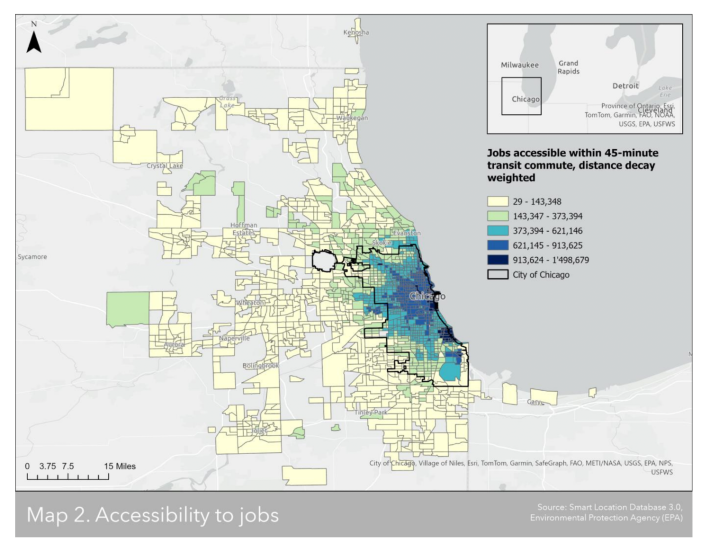
So all of those issues might contribute to people having more exposure to automated enforcement. I know that Equiticity is promoting is the idea that we should be doing safer street designs instead of using automated enforcement, which I agree with you on. But the issue seems to be that a lot of the same legislators who are opposed to automated enforcement are also very opposed to infrastructure changes that would help reduce traffic crash fatalities without enforcement. I'm talking about things like road diets, raised crosswalks, and Neighborhood Greenways [bike-pedestrian priority routes] on side streets.
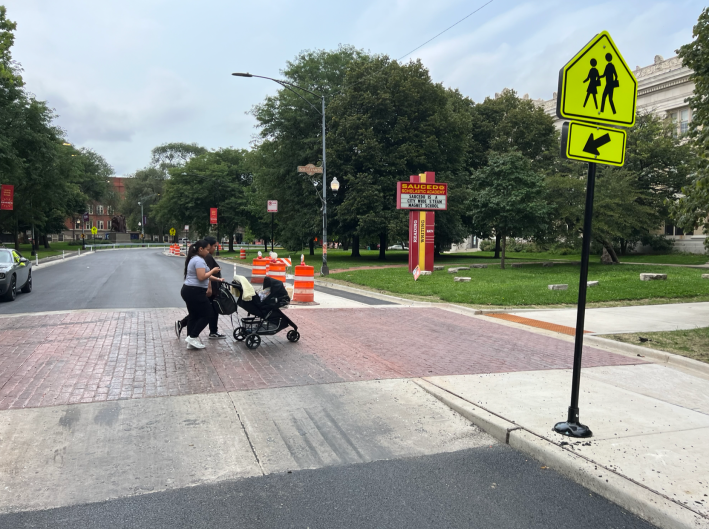
There are a couple other things I'd like to talk about, but I've been talking for a while, so why don't you take some time and let me know if you have any responses to what I just said, or what Equiticity's position is on this stuff?
JMA: Thanks. I think everything you said is fair and true. Nothing you said was misrepresented. And I think it was very interesting how, like you said, the alders, who are expressing equity concerns about the speed limit or automated enforcement are also against the type of improvements that we would like to see, like road diets, and a comprehensive Safe Streets planning process. That's not what we see right now.
When it comes specifically to automated enforcement, if it was up to me to wave a magic wand, there wouldn't be a single speed camera or red light camera in the city. But we would have streets designed to encourage drivers to drive at low and safe speeds, and also prioritizing pedestrians and cyclists and public transit and all that good stuff. But that's not the world we live in right now. We live in our reality in Chicago 2025 and the political climate that we are in, with the resources that we have. So what can we do in the meantime, since we know that we're not going to convince anyone in City Council to remove other automated enforcement cameras. And we know that they're installing new ones, doubling down on this strategy.
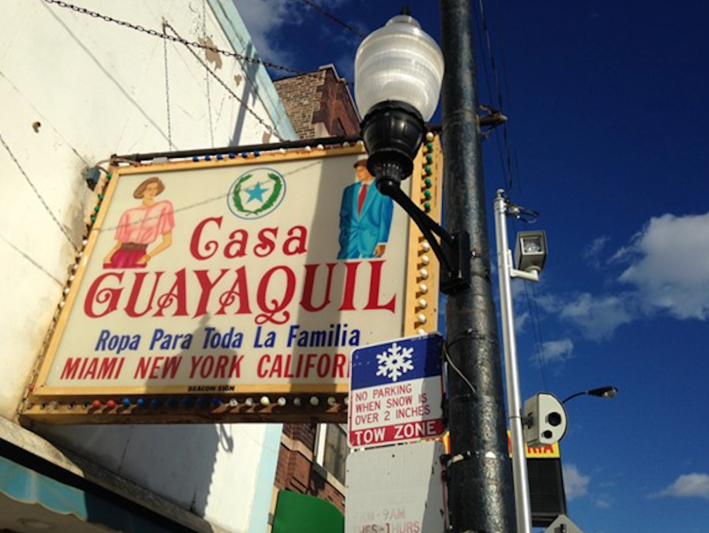
And one of the biggest things that I am against with automated enforcement, specifically with these 16 new cameras, and Equity is as well is, that this wasn't done for public safety. This was done to fill a budget gap.
JG: Right.
JMA: Just on principle, I'm against that. However, like, it's like, I said, this is our reality. It happened, and they're probably going to be installing more. So what can we do to make sure that it is equitable? Because the equity piece in this is not not having cameras in Black and Brown neighborhoods out of fear that was going to create more fines and fees for folks. The equity piece is making sure that we make intersections in Black and Brown neighborhoods safe.
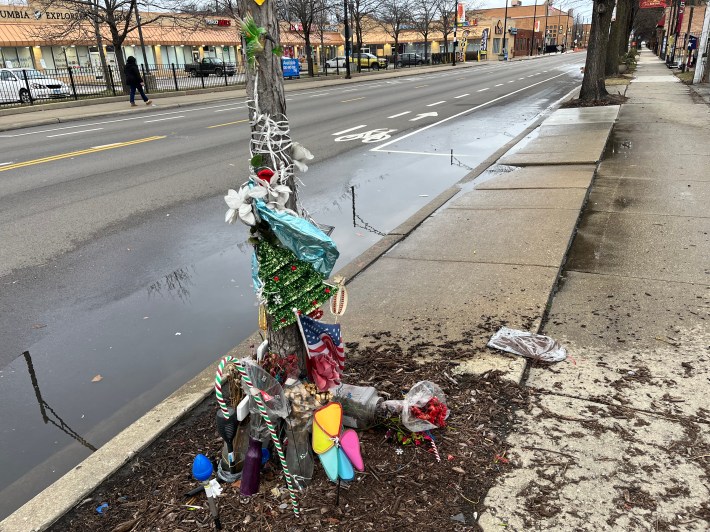
So what does that look like? Some of the things that we've pitched to several alders and Pedestrian and Traffic Safety committee members is we have to find a way to make red light and speed cameras obsolete. And if we have a camera somewhere, it's going to create revenue, so then that revenue is going to go directly to fixing that intersection or that corridor or whatever it is that that's causing people to speed. We're going to fix that problem so that we don't need that speed camera or red light camera there anymore.
Now that might take a lot longer for some than others, or several iterations of that. However, we have a method in place to make sure that we're not doing what the City has been doing, which is just put up a camera, collect the fees, and call it a day, and then where does that money go to? We have an idea where it's supposed to go to, however, is it making its way to Black and Brown neighborhoods? I think many of us would say probably not, and maybe [the City should just clarify] how that funding works.
There's a lot we can do that will bring real equity when it comes to automated enforcement. However, that's just not how the policies are being written. So we have to push our City Council members to do this a different direction, instead of just inviting us from the forefront to be a part of these conversations so that we can kind of address this head on.
JG: Okay, so Equiticity has been focusing on redesigning streets to make them safer, to make automated enforcement obsolete. We'll talk some more about that in a bit. Real quick, I want to get your reaction to a couple of ideas, under the understanding that we have to have automated enforcement for the time being.
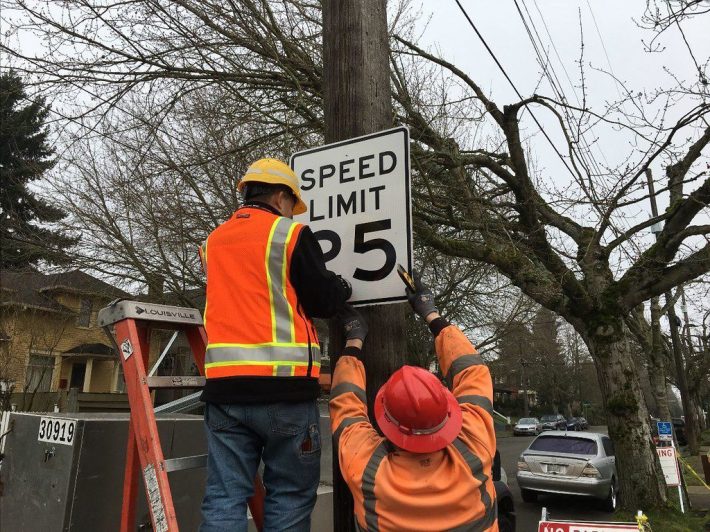
First of all, are you folks in favor of lowering the speed limit to 25 miles per hour, as has been done in peer cities like New York, Boston, Seattle, and Portland, and has resulted in lower crash rates? Those cities are saying it hasn't led to more police enforcement and they haven't had to make major infrastructure changes to have their crash numbers decrease. New York has said that they've had, after they lowered their speed limit, they had the lowest pedestrian fatality rate they've had in a century. So does Equiticity support lowering the speed limit, or what's your what's your POV on that?
JMA: Yeah, we 100 percent, definitely support lowering the speed limit for all the reasons you just cited. But the devil's the detail. We have to make sure that when this ordinance is written citywide, and then hopefully eventually statewide, that we make sure that the spirit of the law is being followed and then it's not being used, for example, as a pretext by police officers to pull over Black and Brown folks.
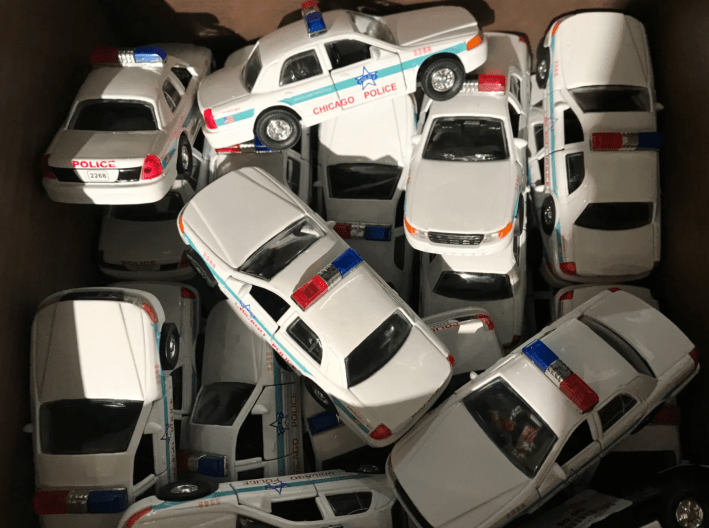
And there was a bit of a perfect storm earlier this year where the speed limit was being voted on in City Council, then talk about automated enforcement, and then the budget. All of those three things made it seem as if the point of this was just to fill a budget gap. And I know that's not true: We really want to improve safety for all road users in the state and the city. However, we have to make sure that the way the law is written reflects that.
JG: Okay. So, it seems like if we are going do any any enforcement that does need to be done, it's probably better if it's done with automated cameras, instead of with police officers, in terms of traffic enforcement being used for racial profiling, an as excuse to justify searches. That's one advantage of automated enforcement, that there isn't a chance for human beings to have bias.
So if we're going to continue with the discussion of what happens if we do keep automated enforcement for the time being. What do you think of the idea of sliding scale fines, or else restoring what used to be a 50 percent discount on fines for lower income Chicagoans that was done under the City's Clear Path Pilot program that was the program that came out in April 2022, after the UIC and ProPublica reports came out showing that there were discrepancies in who was getting ticketed by the cameras. That program of discounted fees ended at least several months ago.
If we assume automated enforcement isn't going anywhere, would you support returning to the 50 percent discounts for low income residents and/or sliding scale fines, so that the wealthier you are, the more you have to pay for a ticket and vice versa?
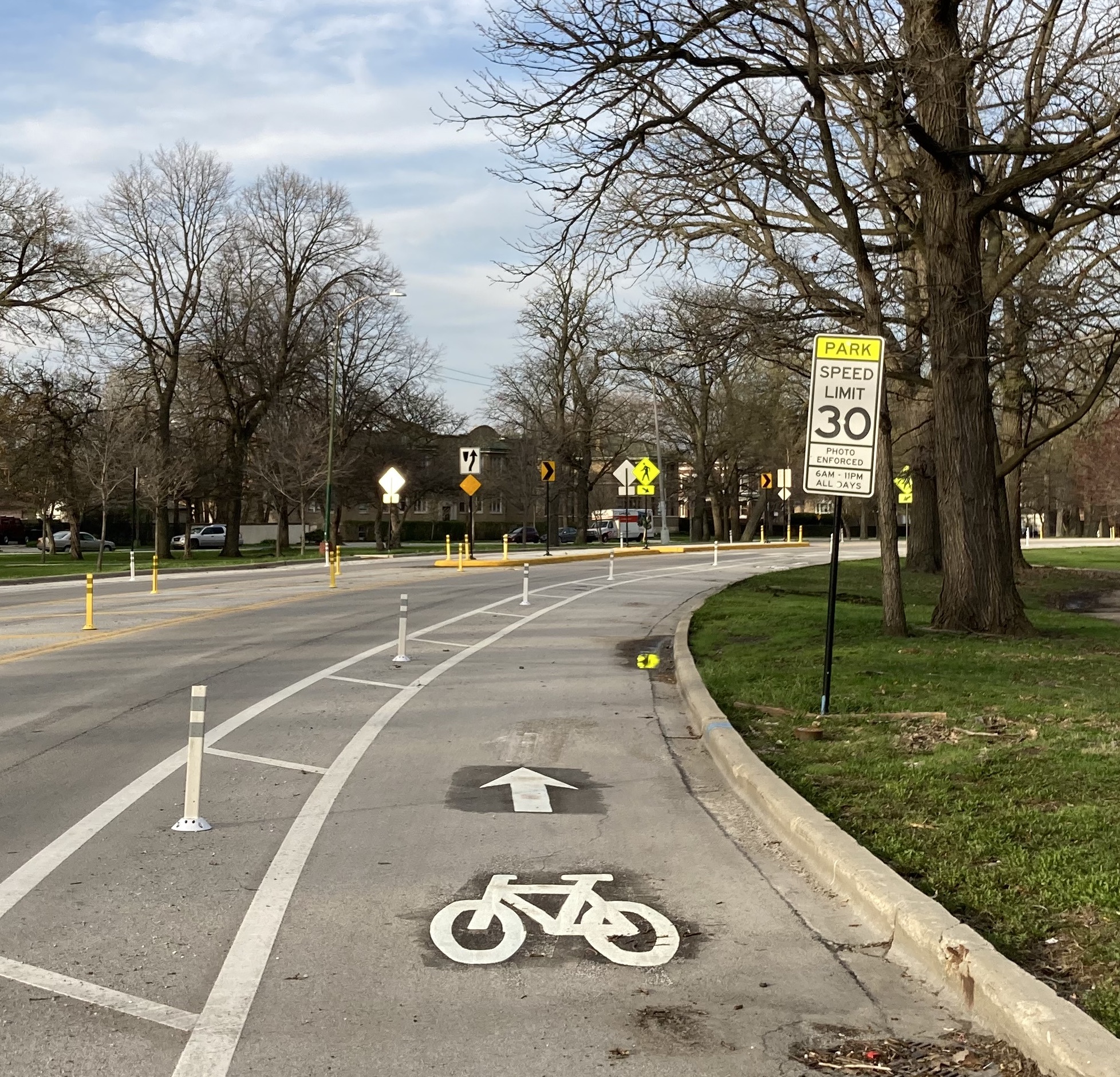
JMA: Short answer, yes, absolutely, that's something that we support. And it's critical that it's paired with a viable plan to address the infrastructure in our streets because, as I mentioned earlier, it's important for us to find a way for us to build safe streets without just fining people. So if all we're doing is making it more affordable to folks to pay these fines, if it's just that by itself, then no, it's just not enough. There's no equity in that.
The real equity comes in when, yes, you will get fined for, going over the speed limit, or running the stop sign, or something like that, of course. However, we're gonna do everything we can to make sure that the environment around us does not promote or does not condone people doing these things, and actually makes it very difficult. So that's probably the most important thing that with different different ways to structure fines and fees, it has to be paired with the infrastructure solution.
JG: All right, I'm gonna ask you one more question about enforcement, and then we can move on to just talking about infrastructure. So let's assume that we lower the speed limit to 25 mph, and we still do camera enforcement. Currently, if you're going more than five mph over the speed limit, then you can get a ticket issued by a camera. The default speed limit in Chicago is 30 mph. So that means you can go up to 35 miles per hour, and as long as you stay at 35 or below, you don't get a ticket. If you go 36 or above, you do.
And that's kind of important because, as you know, people struck at 30 miles per hour almost always survive. People struck at 40 miles per hour almost always die. So we really don't want people driving much faster than 30 miles per hour.
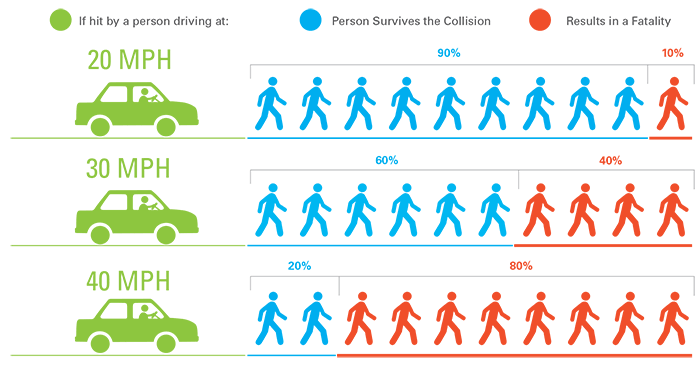
So if we lower the speed limit to 25, what if we were to expand the grace for where you ticketed from six mph to the way it was when we first had speed cameras in Chicago? That way you wouldn't get ticketed unless you're going 11 mph or more over the speed limit.
Currently, you don't get ticketed by a camera for driving 35 mph in a 30 zone. If we lowered the speed limit to 25 but reinstated the 10 mph grace, you could still go 35 in a 25 mile per hour zone, and not get ticketed by a camera. So it seems like that might help address some of the arguments that were made at City Council about like, "Oh, the 25 mph speed limit is going to result in a lot more people getting ticketed."
But it seems to me that if people understand that the posted speed limit is 25, most law-abiding people aren't going to go too much faster than that. So it will lower the average driver speed, and reduce fatal crashes.
It seems to me that if Chicago passed a 25 mph speed limit, average speeds would go down, but ticketing would not go up. That's been the experiences of other cities. For example, New York currently has a 25 mph speed limit with a 10 mph grace. So just like in Chicago nowadays, you don't get ticketed by a camera for doing 35 there. But people generally drive at safer speeds in New York than in Chicago, partly because of the posted 25 mph speed limit.
So what do you think of the idea of bringing back the 10 mile per hour grace for enforcement along with lowering the speed limit, so that you would only get ticketed if you're going 36 or faster in a 25 zone?
JMA: Good question. I'll have to think about this a little bit more. I'm not sure right now.
JG: All right. Well, as promised, I'm going to stop talking about enforcement. Let's shift the conversation to infrastructure.
Tomorrow, we'll continue our conversation about how safer street design can serve as an alternative to enforcement. That portion of our talk includes strategies for winning support for proposed infrastructure changes from local residents and alders.
Read "Part 2: How do we convince residents and alders to support safer street designs?" here.

Did you appreciate this post? Streetsblog Chicago is currently fundraising to help cover our 2025-26 budget. If you appreciate our reporting and advocacy on local sustainable transportation issues, please consider making a tax-deductible donation here. Thank you.
